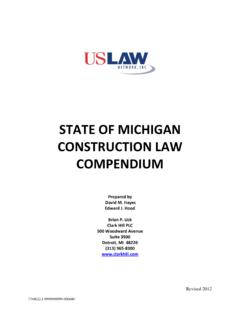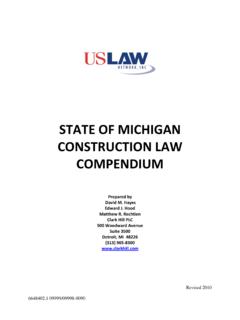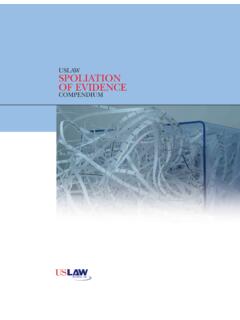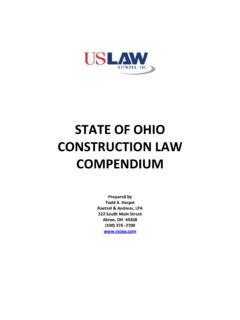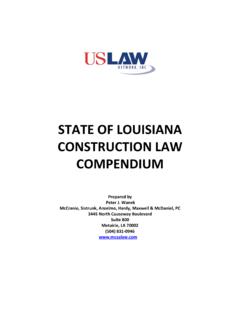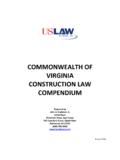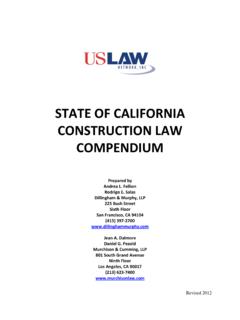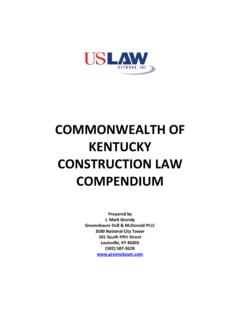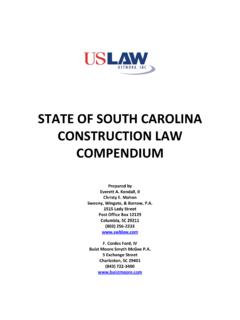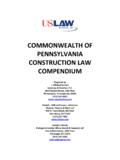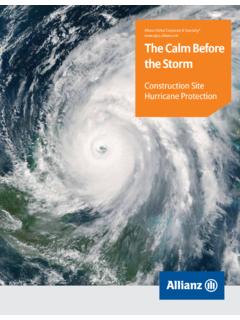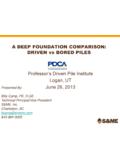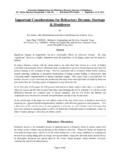Transcription of COMPENDIUM OF MARYLAND CONSTRUCTION LAW
1 STATE OF MARYLAND CONSTRUCTION LAW COMPENDIUM Prepared by Ami C. Dwyer Franklin & Prokopik, PC 2 North Charles Street Suite 600 Baltimore, MD 21201 (410) 752 8700 This outline is intended to provide a general overview of MARYLAND s CONSTRUCTION law. The discussion on any particular topic is not necessarily an indication of the total law related to an area of MARYLAND s CONSTRUCTION law. Most CONSTRUCTION disputes are governed by contract law. With a few variations, the law applicable to CONSTRUCTION disputes in MARYLAND is similar to that found in other states. One important variation to keep in mind is that in negligence claims, MARYLAND is a contributory negligence state and not a comparative negligence state. I. BREACH OF CONTRACT MARYLAND recognizes claims for breach of contract between owner and general contractor and between general contractor and subcontractor .
2 There is a general three year statute of limitations when bringing a breach of contract claim in MARYLAND . MD Code, Courts and Judicial Proceedings, 5-101. The running of the statute is triggered by the discovery rule which states that the statute begins running when the plaintiff knows or reasonably should know of the wrong. DeGroft v. Lancaster Silo Co., Inc., 527 1316, 1320 ( 1987). The exception to the general three year statute of limitations is found in 5-102(a)(5), which provides a twelve year statute of limitations for contracts made under seal. MD Code, Courts and Judicial Proceedings, 5-102. The amount of damages recoverable for breach of contract is that which will put the injured party in the monetary position he would have been in had the contract been performed. Hall v. Lovell Regency Homes Ltd. Partnership, 708 344, 349-350 ( 1998). In a breach of contract action for defective performance of a real estate CONSTRUCTION contract, the primary measure of damages is the cost of repairing or remedying the defect.
3 Id. However, if this proves impractical, the acceptable secondary measure of damages is the loss in value of the property caused by the breach, , the difference between the fair market value of the property without the defect and the fair market value of the property with the defect. Id. Compensatory damages for breach of contract may be recovered subject to limitations of remoteness and speculativeness. Id. However, a contractual obligation, by itself, does not create a tort duty. Wilmington Trust Co. v. Clark, 424 744, 754 (Md. 1981). While a tort action can be founded upon a duty arising out of the contractual relationship, the duty giving rise to the tort cause of action must be independent of the contractual obligation. Mere failure to perform a contractual duty, without more, is not an actionable tort. Id. II. NEGLIGENCE Recovery in an action for negligence requires (1) proof of some duty, (2) a breach of that duty, (3) proximate causation, and (4) damages.
4 Wells v. Polland, 708 34, 39 ( 1998). Recovery for negligence may be limited by the Economic Loss Rule, which generally holds that plaintiffs cannot recover in tort for purely economic losses. Purely economic losses are often the result of a breach of contract and ordinarily should be recovered in contract actions. Pulte Home Corp. v. Parex, Inc., 2007 WL 1501112, *23 ( ) ( 2007). 2 MARYLAND is a contributory negligence state and not a comparative negligence state. In MARYLAND , where a defendant's negligence consists of the violation of a statute, ordinance, or an administrative regulation, and the action for negligence is based upon such a violation, the contributory negligence of a plaintiff will ordinarily bar his recovery. Brady v. Ralph M. Parsons Co., 609 297, 305 (Md. 1992). Homeowners who are subsequent purchasers can assert a common law negligence action against the original builder of a home. Subsequent purchasers not in privity with the builder who sold the home to the original purchasers have a cause of action for negligent CONSTRUCTION and design.
5 Milton Co. v. Council of Unit Owners of Bentley Place Condominium, 708 1047, 1056 ( 1998). Where an unreasonably dangerous condition is discovered in a building, an action in negligence will lie against the architect or builder for the recovery of the reasonable cost of correcting the condition. St. James Const. Co. v. Morlock, 597 1042, 1046 ( 1991). MARYLAND follows the general rule that the employer of an independent contractor is not liable for the negligence of the contractor or his employees. Restatement (Second) of Torts, section 409 (1965). Exceptions to this rule, found in Comment b of section 409, fall into three broad categories: 1. Negligence of the employer in selecting, instructing or supervising the contractor. 2. Non-delegable duties of the employer arising out of some relation toward the public or the particular plaintiff. 3. Work which is specially, peculiarly, or inherently dangerous.
6 Parker v. Neighborhood Theatres, Inc., 547 1080, 1082-1083 ( 1988). The owner of land owes a nondelegable duty to those who may come upon the land. The nature and extent of that duty is fixed by the status of the person claiming it. Council of Co-Owners v. Whiting-Turner, 517 336 (Md. 1986). As the agents of a landowner, contractors owe the same duty to those who come upon the land. Casper v. Chas. F. Smith & Son, Inc., 526 87, 92 ( 1987). The duty of builders and designers is to use due care in the design, inspection, and CONSTRUCTION of a project and this duty extends to those persons foreseeably subjected to the risk of personal injury because of a latent and unreasonably dangerous condition resulting from that negligence. Id. While some jurisdictions hold that a contractor's employees are within the class to whom the owner owes a duty, the majority of jurisdictions, including MARYLAND , hold that an owner's vicarious liability does not extend to employees of independent contractors.
7 Parker v. Neighborhood Theatres, Inc., 547 1080, 1082-1083 ( 1988). Moreover, a landowner may not be held vicariously liable based upon a statutory non-delegable duty where the injuries to an employee of a contractor arise solely from the negligence of the contractor in failing to maintain a reasonably safe work place. In MARYLAND liability of an owner for the negligence of an independent contactor can also be based under the Restatement (Second) of Torts, section 414, which states: One who entrusts work to an independent contractor, but who retains the control of any part of the work, is subject to liability for physical harm to others for whose safety the employer owes a duty to exercise 3 reasonable care, which is caused by his failure to exercise his control with reasonable care. Although the premise owner must exercise reasonable care to ensure that his or her property is safe for the employees of an independent contractor at the onset of the work, the owner will not be liable during the progress of work unless it is demonstrated that he or she has control of the details and the manner in which the work is to be accomplished.
8 Wajer v. Baltimore Gas and Elec. Co., 850 394, 405 ( 2004). This requires the retention of a right of supervision by the owner such that the contractor is not entirely free to do his work in his own way. Parker v. Neighborhood Theatres, Inc., 547 1080, 1085 ( 1988). III. BREACH OF WARRANTY In CONSTRUCTION cases plaintiffs will usually assert causes of action for breach of warranty. The breach of warranty can be based either on express warranty provisions found in the contract between the plaintiff and the general contractor or based on warranties implied by law. In MARYLAND there is a general two year statute of limitations on breach of warranty claims. MD Code, Real Property, 10-204. The statute of limitations begins running when the injury and its general cause are discovered or should have been discovered or within two years of the expiration of the warranty, whichever occurs first.
9 Lumsden v. Design Tech Builders, Inc., 749 796, 804 (Md. 2000). A. Breach of Express Warranty Under MARYLAND Real Property Article 10-202(a) the means by which an express warranty may be created by a vendor include: (1) Any written affirmation of fact or promise which relates to the improvement and is made a part of the basis of the bargain between the vendor and the purchaser creates an express warranty that the improvement conforms to the affirmation or promise. (2) Any written description of the improvement, including plans and specifications of it, which is made a part of the basis of the bargain between the vendor and the purchaser creates an express warranty that the improvement conforms to the description. MD Code, Real Property, 10-202. In contracts for the CONSTRUCTION of new homes in MARYLAND , builders are required to register with the Consumer Protection Division of the Office of the Attorney General pursuant to 10-603 of the Real Property Article.
10 They are also required to offer a new home warranty security plan, which at the minimum must warrant: (1) For one year, the new home is free from any defects in materials or workmanship. (2) For two years, the new home is free from any defect in the electrical, plumbing, heating, cooling, and ventilating systems; and (3) For five years, the new home is free from any structural defect. MD Code, Real Property, 10-604. The measure of damages for the breach of an express warranty in the sale of real property is the same as the measure of damages for breach of contract. Hall v. Lovell Regency Homes Ltd. Partnership, 708 344, 349-350 ( 1998). 4 B. Breach of Implied Warranty In the CONSTRUCTION context, the obligation to use ordinary skill and care in constructing a house or performing other work is implied by law independent of any contract. Worthington Const. Corp. v. Moore, 291 466, 467 (Md. 1972).
